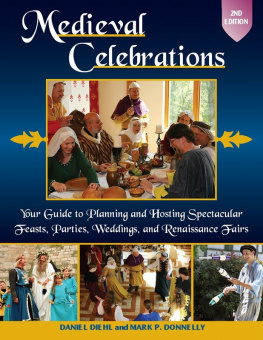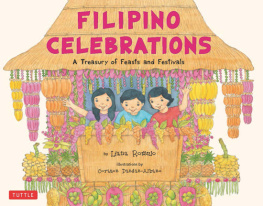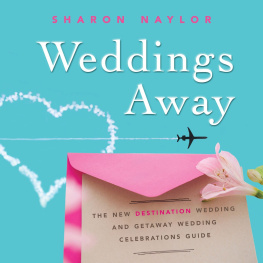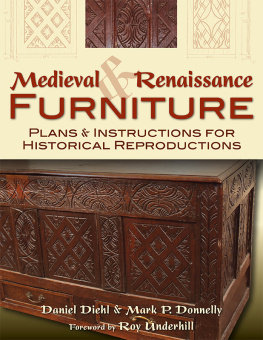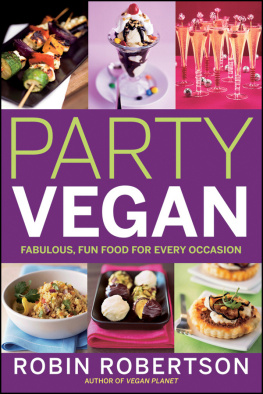Medieval Celebrations
SECOND EDITION
Your Guide to
Planning and Hosting
Spectacular Feasts,
Parties, Weddings,
and Renaissance Fairs
Daniel Diehl
Mark P. Donnelly
STACKPOLE
BOOKS
Preface to the Second Edition

S ince the beginning of recorded history people have been fascinated with the idea of recreating events from the past. The Greeks and Romans reenacted earlier military victories and made the struggles of their ancient gods and goddesses come to life on the stage. Medieval European monarchs also reenacted Greek and Roman battles, both real and legendary, and in the nineteenth century, medieval tournaments were recreated by the nobles and gentry of England and Europe. The enjoyment of much of this historical recreation was, however, limited to the privileged classes. By the twentieth century the stories of kings, knights, and courtly love became common themes in popular entertainment, but seeing history on stage and screen was very different from actually being there in person. It was not until the 1960s that a few people in the US, UK, and Europe became brave enough to risk being mocked by their neighbors and began recreating medieval life on a regular basis. It was a bold step backward.
Obviously these fanciful, popular recreations were a far cry from the bleak realities of medieval life. The Middle Ages were a time fraught with political turmoil, brutal and incessant warring, random violence, unsanitary living conditions, plague, and famine. Despite these shortcomings, there are few images more appealing than a magnificently armored knight riding out in the name of his lady, his king, and the church to do battle against the forces of evil. Who among us does not long to change places with one of those glorious warriors or fair maidens from the past?
Since their introduction in the 1960s, the popularity of these splendidly archaic recreated medieval feasts, tournaments, and Renaissance fairs has increased tremendously. Medieval military reenactments are staged in nearly every culture old enough to have a recorded medieval history, and medieval weddings are among the most popular themed weddings in all of Western culture. If the United States has added its own unique contribution to the celebration of all things medieval it is the concept of the medieval or Renaissance fair. According to online listings, there are now no less than 127 medieval and Renaissance fairs scattered across the forty-eight contiguous states.
It is no wonder that the Renaissance fair is so popular; the romance of escaping, at least for a day, from the stress-filled, work-a-day modern world can be very attractive and a lot of fun. Beyond question, a medieval theme can help make any special occasion even more memorable. A wedding with people dressed in fairy-tale clothes or a Christmas party with minstrels and a table groaning under the weight of strange and rich-smelling food will always be remembered as something spectacular, daring, and magical.
But wanting to hold a medieval event and having access to all of the relevant information are two distinctly different things. Naturally, you can hire a company to plan your event for you, but unless you have a whopping budget and are convinced the party planners know their history, you have no way of knowing what you may wind up with or how much it may cost. By far the most economicalnot to mention enjoyableway to host a medieval celebration is to plan and execute it yourself. So, to those of you who feel the attraction of diving headlong into the past but really dont know where to begin, this all-color, greatly expanded edition of Medieval Celebrations is dedicated specifically to you.
We wish the very best of luck to all of you.
Daniel Diehl & Mark P. Donnelly
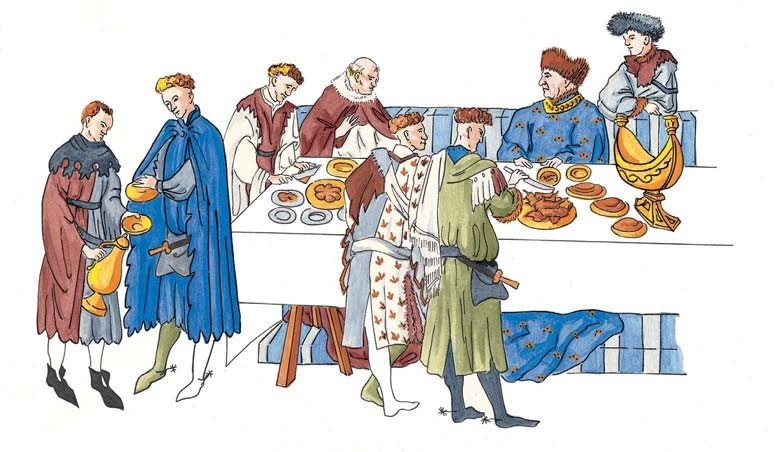
CHAPTER 1
Why Host a Medieval Celebration?
T he popularity of recreating medieval events, celebrations, and feasts has been encouraged and promoted by Christmas madrigal dinners, hosted by many civic and church organizations across the United States, England, and Europe. Likewise, the popularity of the Medieval Times restaurant chain, the growth of medieval reenactment groups around the globe, and dozens of Renaissance fairs held throughout the United States have all helped broaden the appeal of selectively recreating the Age of Chivalry. The more one sees of this long-gone age, recreated by people who are, by and large, just like the rest of us, the greater the appeal of visiting the Middle Ages for a day or two. Stepping into the past for a few hours is a great way to take a vacation to a far-off place without the hassle and expense of traveling thousands of miles. In fact, it is far more fun to take part in one of these medieval events than it is to attend them as a mere spectator.
Even if you have never hosted a party before and your knowledge of the Middle Ages is limited to a few old Robin Hood movies, this book is designed to guide you through every step necessary to help you host a medieval banquet that will make your party-planning skills legendary. And there are enough historical tidbits thrown into these pages that by the day of your banquet, you will sound like an authority on medieval history, customs, and lifestyle.
The truth of the matter is that with a little time and effort, a sense of adventure, and not much more money than it would cost to host any other type of party, you can successfully mount a beautiful and memorable medieval celebration. By taking your time and following the simple chapter-by-chapter guidelines provided in the following pages, you can host a medieval event that you and your guests will be talking about for years to come.
Defining the Middle Ages

The Middle Ages, in its greater historical aspect, is a vaguely defined period of time. Historians endlessly argue about when it began, when it ended, and even what, exactly, it was. For the sake of simplicity, we will define the Middle Ages as the period between 1066, when the Normans conquered England, and 1450, when the Renaissance and the rise of the nation-state brought an end to the feudal system that had dominated the political and social life of the medieval period. Basically, this gives us four wonderfully exciting centuries to play with. Since this book is in no way intended to be an historical treatise on medieval history, we are going to take the liberty of picking and choosing elements from this broad period that will help you create the most memorable medieval event possible.
For a variety of practical reasons, we will be using an amalgam of decorating styles, manners, and foods from this period to create our medieval feast. Because few written recipes from the early years of this period survive, we will extract our menu items primarily from cookbooks of the fourteenth and fifteenth centuries (the 1300s and 1400s). The clothing styles and decorative motifs covered in our chapters on costumes and decorating are taken primarily from the fourteenth century because they are far simpler, and therefore easier to reproduce, than those of the later Middle Ages. Our selection of music and dance comes from a variety of times and places throughout the medieval period. Similarly, while we will discuss specific customs from many different countries, we will mix and match those elements to guarantee that your guests have the greatest amount of fun possible during their short visit to the Middle Ages.

